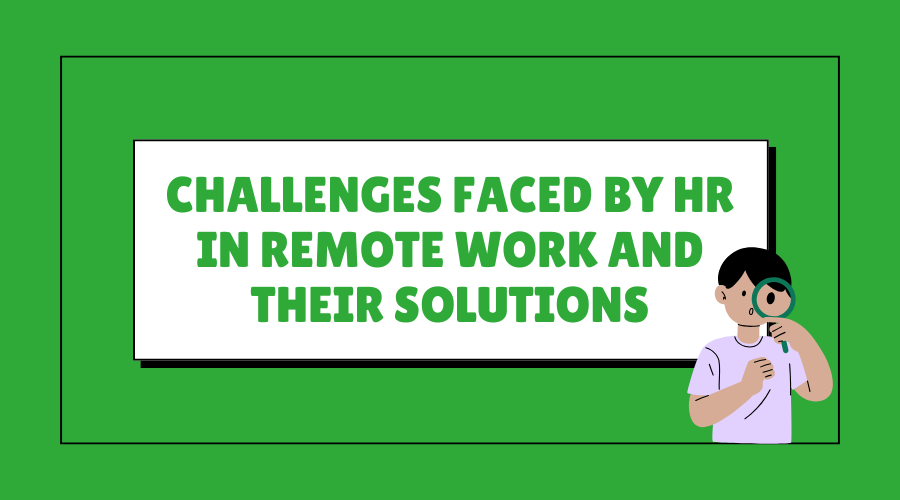
Let’s be honest — The transition to remote work has changed many aspects of how businesses operate, and among them, HR has probably been impacted the most because managing remote teams isn’t as easy as it seems. How can HR improve its practices due to remote working? This is the serious question many HR experts have as they adapt to leading remote teams, managing employee engagement metrics and sustaining productivity. The shift to remote work has transformed not just how employees do their jobs but also the function of HR departments.
Years ago before advanced digital technology, HR practices were focused on in-person setups, but, as remote working is becoming the new standard, HR will have to find new ways to manage remote teams effectively. HR practices for remote teams must be digital now making sure that policies and tools are effective and balanced to make every employee working from home feel like they belong.
The question of how can HR improve its practices due to remote working is multifaceted because it means using technology, transforming how to track performance, encouraging effective and open communication, and taking care of employee well-being, while managing the challenges of a virtual office. Sounds like a challenge, right? Let’s break it down. In this blog, we’ll cover crucial steps on how can HR improve its practices due to remote working and build an effective remote workforce that results in more productivity than ever before.
Moving ahead, we’ll also explore how HR departments can address the hurdles of engaging remote employees, the use of HR technology in managing the remote workforce, and how to manage the employees’ well-being in remote setups.
Challenges Faced by HR in Remote Work and Their Solutions

Handling a remote team isn’t as easy as it seems because it requires reliance on digital solutions. It is very important to implement strong monitoring systems that respect employees’ privacy and also provide insights about their performance. No doubt remote work provides a lot of benefits, but it also poses unique challenges for both employees and organizations. So, how can HR improve its practices due to remote working? By dealing with these challenges directly.
Communication Barriers
Have you ever sent a message to someone and waited hours for their reply thinking they’re ignoring you? Well, it’s so common in remote teams. Poor communication or one-sided communication is one of the biggest challenges that HR faces when managing remote teams. It results in lack of trust, low productivity, and also leads to negativity.
In physical offices, everyone can share their ideas can communicate freely, but in remote offices, all the communication and interactions need to be planned. It’s harder to understand the body language or tone of employees which makes virtual communication ineffective.
HR should use remote communication tools like Slack, Microsoft Teams, or Zoom for regular check-ins and team meetings to make sure that no one feels left out and disconnected. If HR just asks “Hey, how’s your day going?” their employees feel heard and valued which keeps them engaged and connected to their work.
Maintaining Employee Engagement
It’s so easy and common for employees to get disengaged while doing remote work because they don’t feel valued and company puts no effort to keep their morale high. Disengagement of employees in remote work is harmful to the company which leads to lower productivity and team morale because employees without any kind of interaction with team members, can slowly lose interest in their work and become disengaged and unmotivated.
This can be overcome if HR takes these steps:
- Virtual team-building and check-in activities.
- Virtual breaks or relaxed group chats.
- Occasional virtual social activities to keep the engagement among employees.
These measures can help employees feel connected to a community. Even if you’ve been working remotely, recognizing both individual and team accomplishments is an important part of keeping people engaged. This boosts morale and leads to a better remote work culture as it creates opportunities for employees to connect outside of work-related tasks and does wonders for team evolution.
Tracking Performance and Productivity
Performance management is more complex in remote teams as everyone is working from home, and HR can’t do direct supervision.
To tackle this, HR should set clear goals and use tools for performance tracking like Asana or Trello instead of asking about their progress again and again. Regular feedback sessions also allow for performance assessments to keep employees on track and make sure that productivity remains high and employees feel supported.
Ensuring Compliance and Security
Last but not least, compliance & security is a major concern in remote working. When employees are working out of multiple locations, it’s much more complicated to keep the company data secure and to make sure that everyone is following rules and regulations. Therefore, HR needs to make strict security policies to avoid any kind of issues.
HR can prevent these issues if they introduce secure communication platforms and workshops or seminars that offer proper training on data protection and security.
Strategies for HR to Enhance Practices in a Remote Work Environment

The traditional methods of building strong employee relations have changed due to remote working. Because it’s not just a trend, it’ll stay in coming years. So, if HR doesn’t adopt these advanced strategies, their employees will disengage and no company wants it, right? HR departments are challenged to adapt to workplace difficulties and make strategies according to these challenges which can maximize productivity and engagement.
So, how can HR improve its practices due to remote working? Here are the ways HR can implement that will improve the remote work environment and establish a positive work culture.
Implementing Digital HR Tools
Adapting to digital technology is the first step to improving HR practices remotely. If your company is still stuck with outdated HR systems, it’s time for an upgrade because no one wants to spend hours filling out forms when technology can handle everything in seconds. By selecting the right digital tools, HR experts make sure that their employees have easy access to resources and they can communicate effectively without any obstacles. These tools streamline processes, automate tasks, and keep employees connected. If HR adopts HRMS (Human Resource Management Systems), communication platforms, and performance management software, they can effectively manage remote teams.
- HR Technology: This category includes platforms such as BambooHR, Workday and Gusto that are essential for payroll, employee performance tracking and managing benefits in a remote environment.
- Communication: Tools like Slack, Zoom, and Microsoft Teams are best for real-time communication & collaboration among remote employees
- Project Management Tools: Tools like Trello and Asana assist HR with task tracking, deadline setting and realignment of projects.
By leveraging these tools, HR can guarantee employees possess the resources necessary to perform their jobs efficiently while simultaneously streamlining their own workload.
Providing Continuous Training and Development
Continuous learning is very important, especially in teams where employees feel left behind as they don’t get any career opportunities. HR makes sure that employees are provided with continuous learning and have access to ongoing training and development programs.
Online training platforms LinkedIn Learning, Udemy, or even local in-house training will help the employees upskill and stay ahead of others. HR can design personalized development programs that should include skill-building courses, virtual workshops, and mentoring programs that encourage knowledge-sharing among remote workers. Nobody wants to feel stuck in their career. HR should offer real growth opportunities—not just boring webinars for the progress of their employees.
HR must also support team managers with leadership training required to lead effectively in virtual teams. Managing remote teams needs specific competencies, including remote communication, emotional intelligence, and conflict negotiation. Development can help managers cope with remote leadership challenges by training remote leaders.
Continuous learning is key to ensuring employees remain engaged and feel supported in their career progression.
Prioritizing Employee Well-being and Mental Health
Last but not least, HR also needs to take care of the mental health of employees as continuous workload can lead to stress and frustration because remote work is just a continuous work cycle without any mental break, so HR should offer their employees mental support before they burn out mentally. The absence of face-to-face interaction may cause remote employees to feel loneliness, which, in turn, contributes to stress and burnout.
HR is also able to offer a wide range of wellness programs to promote employees’ mental health. Providing access to counseling services, wellness training, or stress-management programs are just a few of the ways that employers and HRs can adopt to help employees keep them stress-free and maintain a healthy work-life balance. Preventing burnout starts with encouraging employees to take breaks, not work overtime or at the end of the workday.
HR can also implement mental health days or wellness programs to ensure that employees have the time and space to relax. This creates positive, supportive remote work environment as employees see HR cares about their well-being and doesn’t just treat employees to work every time.
Focusing on employee well-being, HR plays an essential role in creating a healthier and balanced remote work environment.
Building a Strong Remote Culture
One of the biggest challenges HR is facing here is how to maintain a robust company culture when teams are working remotely, which is critical for keeping employees engaged and connected.
- Virtual Meetings: Frequent virtual town halls and check-in meetings make sure that everyone is aligned with company goals, values, and expectations.
- Transparency and Trust Building: Trust in remote teams requires the encouragement of transparency in communication and decision-making.
- Team-Building Activities: HR can organize some informal activities like playing online games, virtual happy hours, virtual coffee breaks, etc to keep the team engaged and motivated.
Building a supportive, transparent, and engaging culture is necessary to keep remote employees motivated, engaged, and aligned with the company mission.
Offering Flexible Work Arrangements
Flexibility is one of the biggest advantages of remote work and HR should leverage that by providing different flexible work arrangements.
- Giving Employees the option to choose to work at their preferred timing or adopt flexible schedules increases job satisfaction and reduces stress.
- Hybrid Work Model: A hybrid model of working coupled with in-office days can provide more balance and can also be modified to accommodate the requirements of individual employees.
- Work from anywhere: HR should provide options to employees to work from various locations (a coffee shop, coworking space, or even another country) in a way that can boost productivity and employee satisfaction.
By providing flexible work options, HR can help employees achieve a better work-life balance, which leads to increased engagement and retention.
Conclusion
As companies gradually adopt remote working, the question of how can hr improve its practices due to remote working is of utmost importance. HR professionals must adapt to this new landscape by using effective strategies around remote teams. HR can bridge the gap between isolation and disengagement, and if they utilize tools effectively, provide remote and flexible working, and promote participation through wellness and employee well-being, they can create a productive, engaged, and motivated workforce.
Remote work isn’t perfect, difficulties of working remotely are real: communication, performance tracking, maintaining company culture, and so on. However, HR can solve these challenges through the right approaches, making remote employees feel engaged and empowered.
In the coming years, HR’s evolving role will play an important part in the future of remote work, helping businesses to make exceptional progress and create a strong workforce. At the end, HR’s role isn’t just about policies anymore—it’s about making remote work best for everyone

